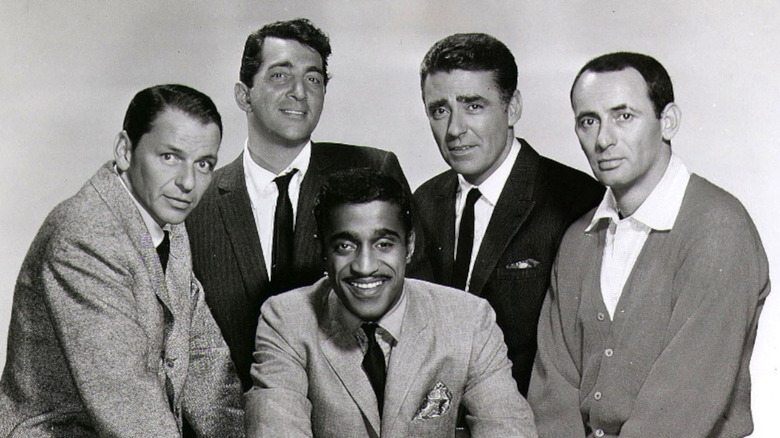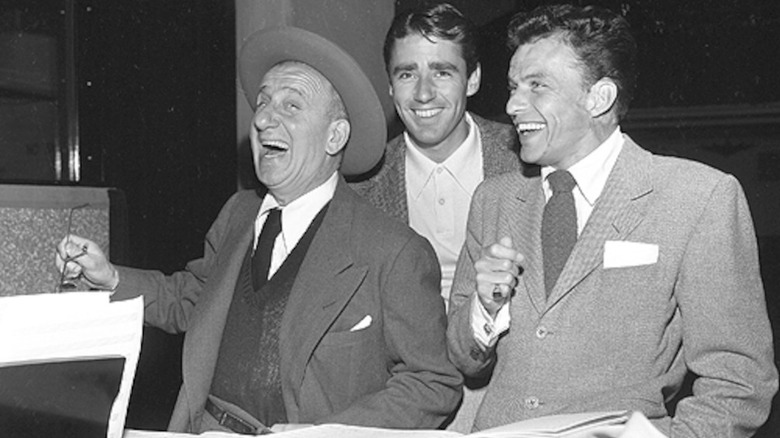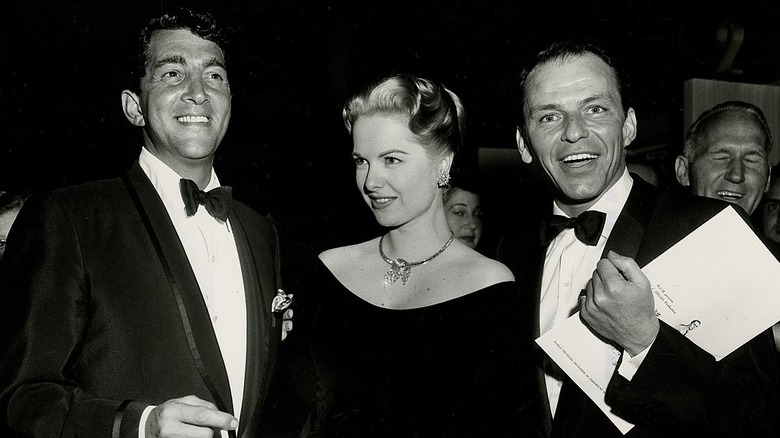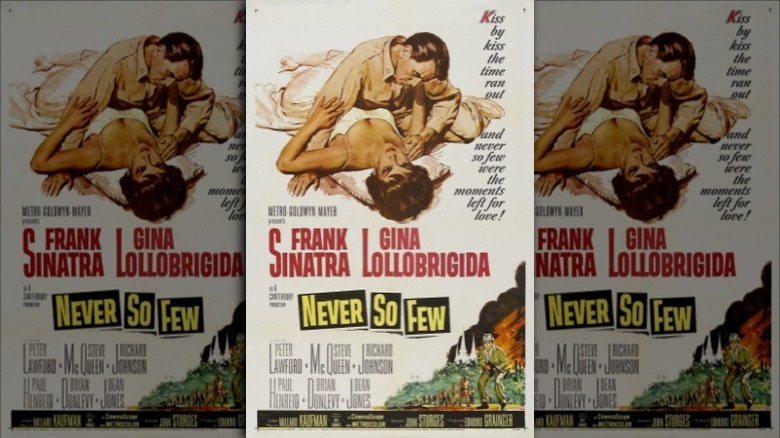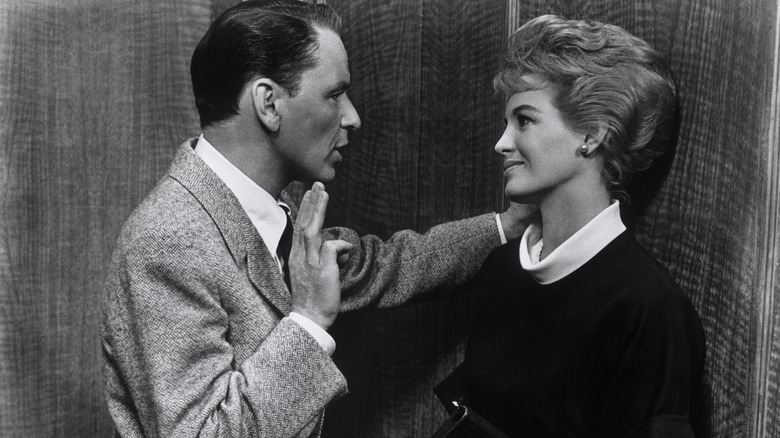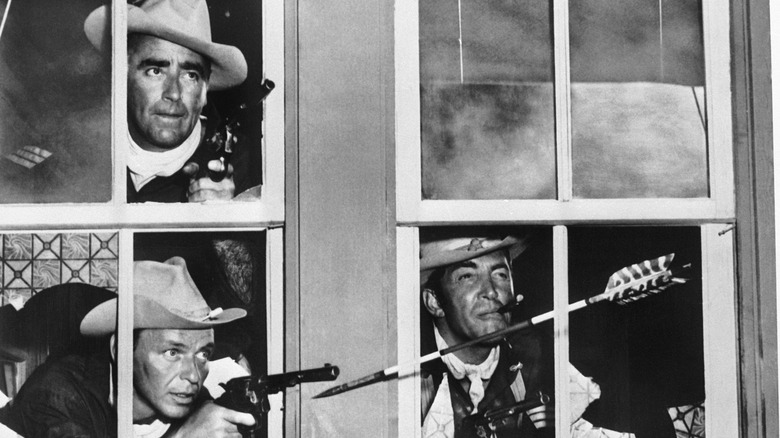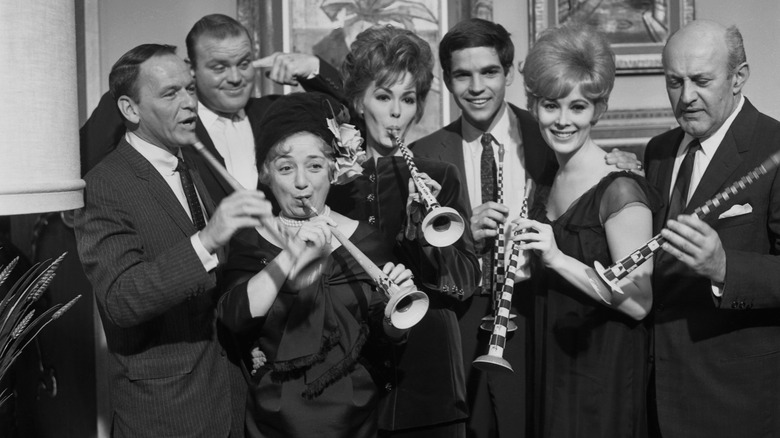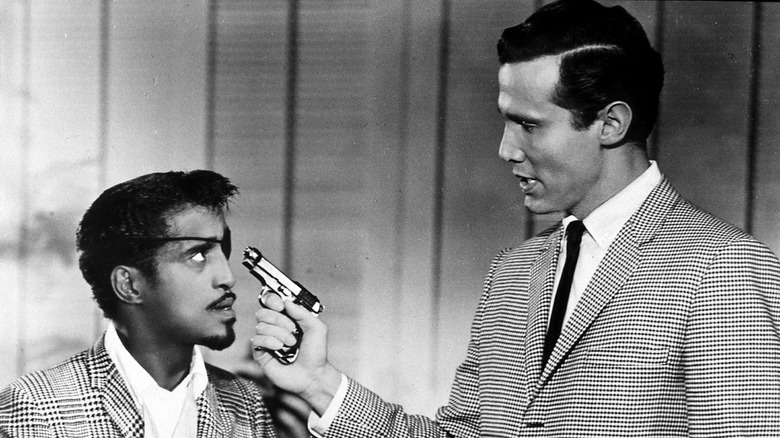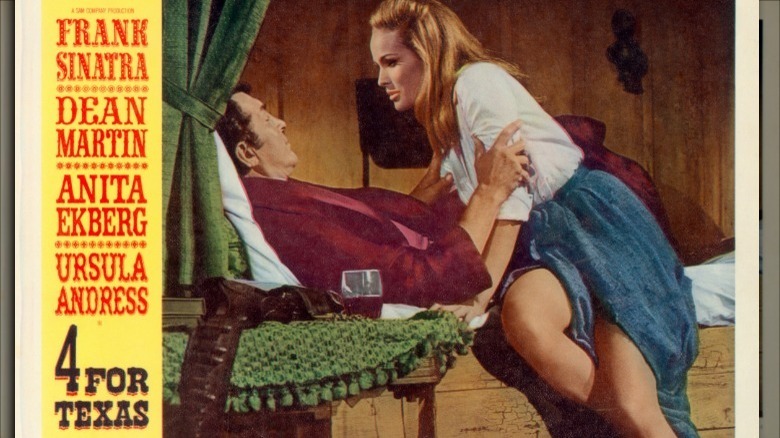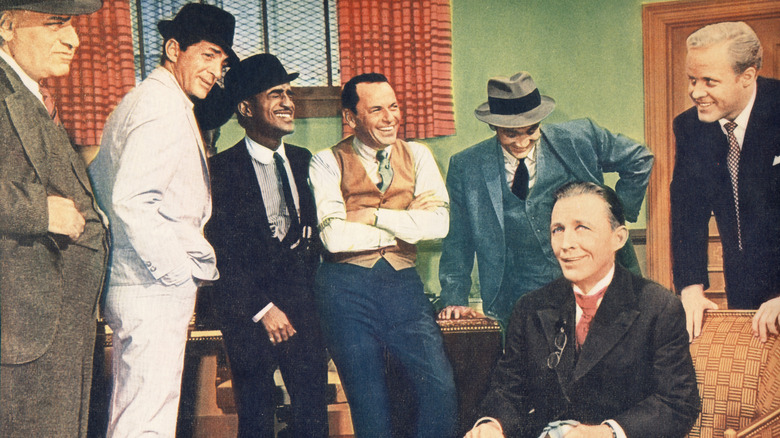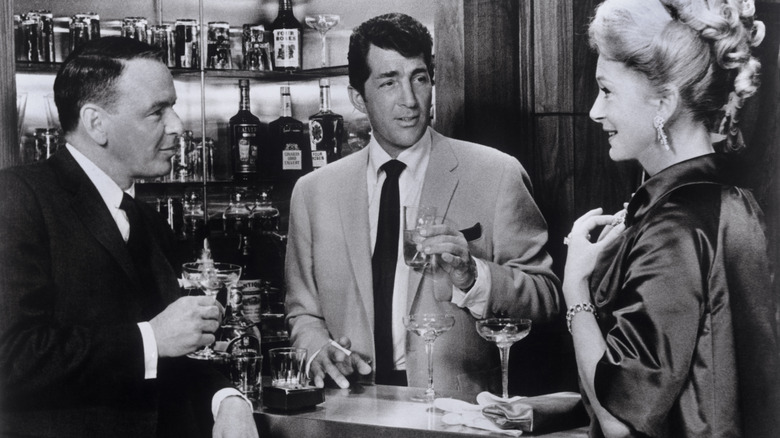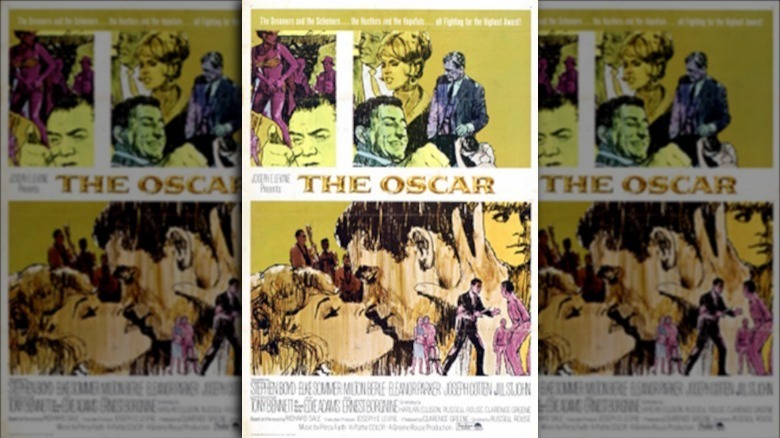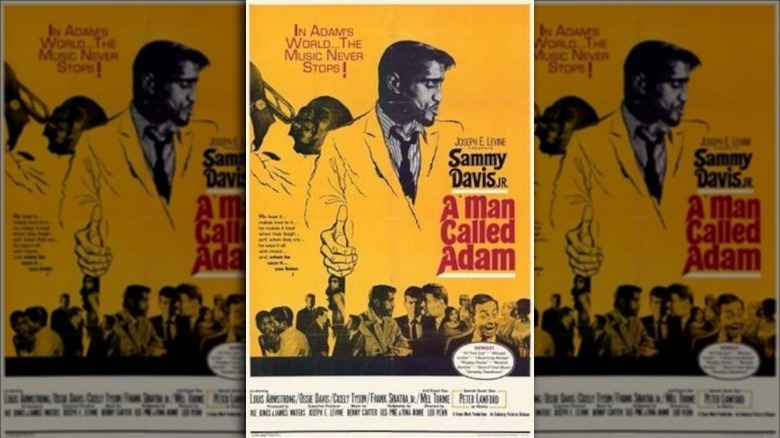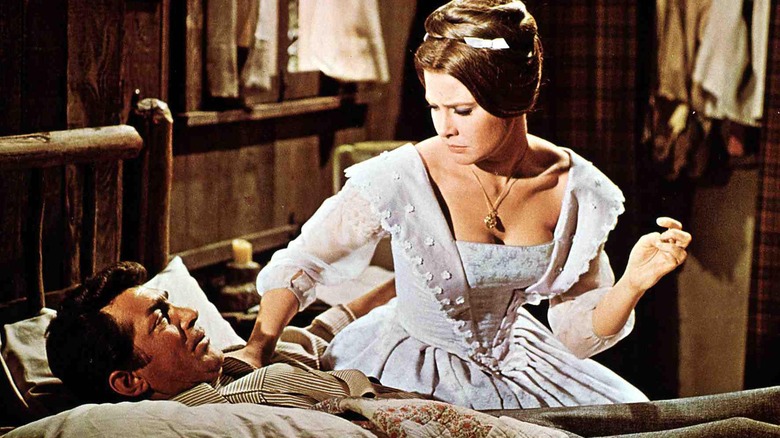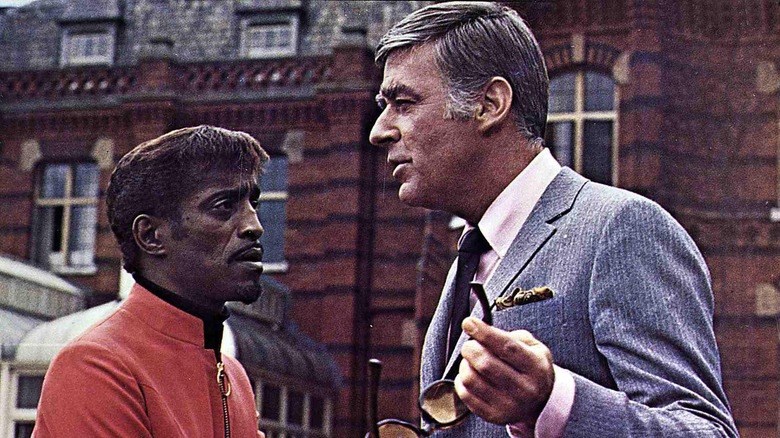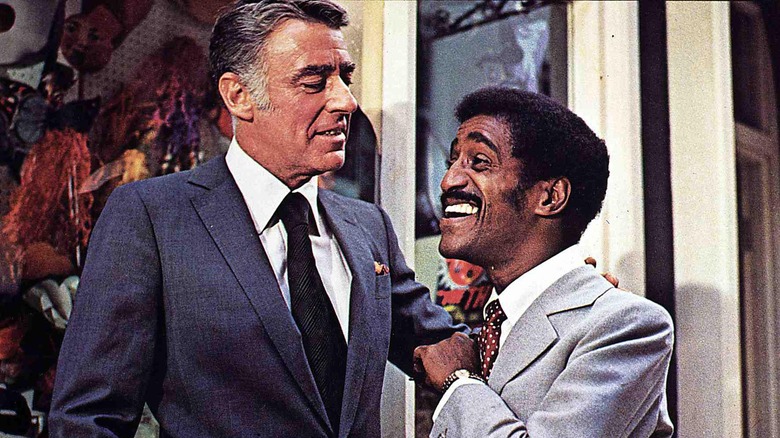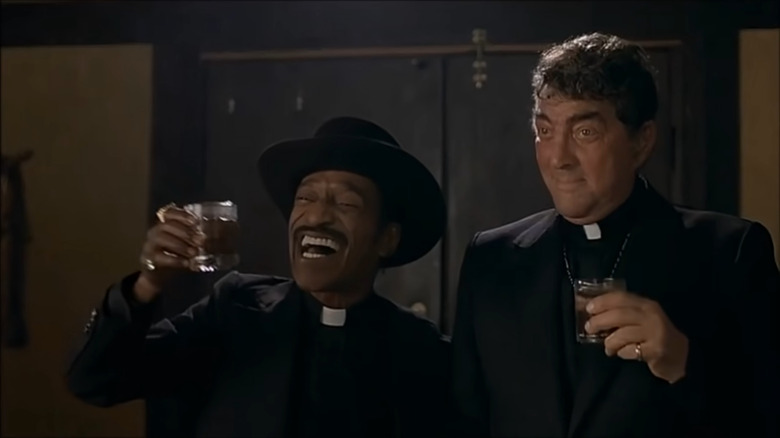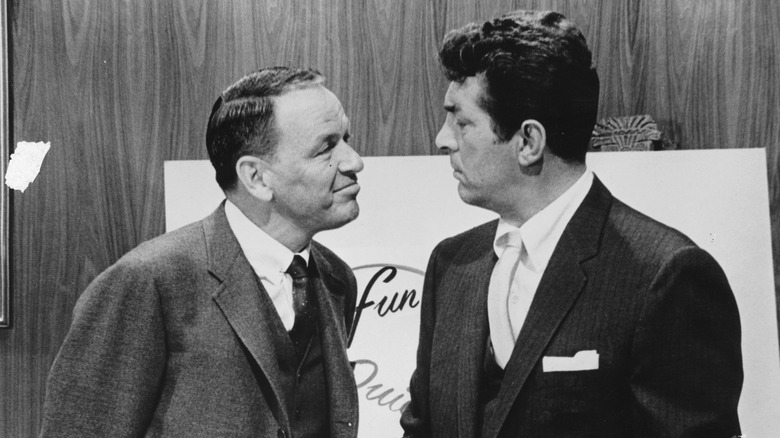Every Movie Starring The Rat Pack
There are few people in this world that remain "cool" forever. Every new generation has a tendency to regard the cool icons of their elders with some serious side-eye, a disdain helped along by changing fashions and lifestyle choices.
A prominent exception to this rule is The Rat Pack — Frank Sinatra, Dean Martin, Sammy Davis Jr., Joey Bishop, and for a time Peter Lawford (along with Shirley MacLaine and Angie Dickinson, who were "mascots" according to Desert Sun). Everything about The Rat Pack should be deprecated in the modern day. They smoked and drank too much, they made music that's no longer topping the charts, they dressed in suits and used slang that's long been consigned to history.
But something about the sheer collective charisma of The Rat Pack has elevated it to iconic status. No matter how much time goes by or how much things change, The Rat Pack is still held up as the epitome of cool. Which explains their collective success — not only did they pioneer Las Vegas Residencies, they also sold scads of albums even as their style of music was pushed aside by rock 'n' roll. And they made movies — a lot of movies. Here's every movie starring The Rat Pack.
It Happened in Brooklyn (1947)
Starring Rat Packers Frank Sinatra and Peter Lawford, "It Happened in Brooklyn" is typically regarded as a throwaway film. As noted by The Radio Times, it was filmed in black and white instead of Technicolor, a sure sign that it was considered an "economy" film at the time. And its plot (detailed by Obscure Hollywood) involving an heir to a dukedom (Lawford) who travels to Brooklyn to cure his shyness is silly even by 1940s romantic comedy standards.
But there are reasons not to write this one off. The silly plot "doesn't matter much" according to Time — because the music and the singing is spectacular enough. Not only is Sinatra performing at the top of his game (Time notes he "performs naturally and unaffectedly"), but the presence of Jimmy Durante elevates everything, most notably his duet with Sinatra on the song "The Song's Gotta Come From the Heart."
Some Came Running (1958)
Starring Frank Sinatra and Dean Martin and co-starring Rat Pack "mascot" Shirley MacLaine, this Vincente Minnelli film is based on the 1957 James Jones novel of the same title (per TCM). After the adaptation of Jones' "From Here to Eternity" was such a huge hit in 1953, Decider notes that Hollywood was pretty eager to repeat that success. Variety describes the story as "pure melodrama": Sinatra is Dave Hirsch, a former novelist and bitter war veteran who returns to his hometown in Indiana with Ginnie, a sex worker (MacLaine), in tow. Hirsch despises his successful brother, befriends wild gambler Bama (Martin), and falls in love with a local schoolteacher but winds up marrying Ginnie.
It all ends in tragedy, of course, but Vincente Minnelli was an incredible filmmaker. Britannica notes that Sinatra, Martin and MacLaine all put in highly regarded performances (MacLaine earned her first Oscar nomination for this role) — despite the fact that Sinatra was reportedly unhappy on set, even walking off the production several times.
Never So Few (1959)
Based on the novel by Tom T. Chamales (itself inspired by a real-life World War II unit), this is the story of American and British commanders who worked with local guerrillas in Burma to resist the invading Japanese army in 1943 (per TCM). It starred Frank Sinatra as a maverick Office of Strategic Services (OSS) officer alongside fellow Rat Packer Peter Lawford.
Interestingly, according to author Wes D. Gehring in his book "Steve McQueen," Sammy Davis Jr. was initially cast in the film, but after angering Sinatra with some interview comments, "old blue eyes" took the role away form him and handed it to a young Steve McQueen. Sinatra was at the height of his fame and increasingly happy to use his power to reward or punish his fellow Rat Packers. As noted by Radio Times, the film was a breakout role for McQueen, who would partner with director John Sturges on subsequent classics like "The Great Escape."
Ocean's 11 (1960)
The quintessential Rat Pack movie starred the whole gang: Sinatra, Martin, Davis, Lawford, Bishop, and Angie Dickinson (with an uncredited cameo by Shirley MacLaine). According to The AV Club, they filmed it in the mornings while performing twice a night at The Sands, which is a pretty grueling schedule for a relatively lighthearted heist film. The Rat Packers play former paratroopers gathered by their hero commander, Danny Ocean (Sinatra), to undertake a complex robbery scheme involving five Las Vegas casinos (per TCM).
The film was a box office success, according to Britannica, and epitomized "cool" in the early 1960s. But it was also regarded as a flimsy production filled with lazy improvisation, inscrutable inside jokes, and a working process that deprecated second takes. It's also a fascinating time capsule, depicting a Las Vegas before it was glamorous and long before it became a tourist spot — as The Hollywood Reporter notes, the film did a lot to establish Vegas as a cool place for cool people.
Sergeants 3 (1962)
This is mostly notable as the last "official" Rat Pack film to involve Peter Lawford. As noted by Town and Country Magazine, the falling out between the two men — Frank Sinatra and Lawford — was ugly and complicated. Sinatra was having an affair with Lawford's wife (sister of President John F. Kennedy), which may have been a scheme to get influence for Sinatra's mobster friends. Whatever the truth of the situation, it was the end of Lawford's tenure as a member of the Rat Pack (via Cinapse).
The film stars Sinatra, Dean Martin, and Lawford as U.S. Army sergeants posted in Indian Territory in 1870 (Joey Bishop is there, too, in a smaller role). Lawford plans to retire from army life against the wishes of his buddies. They meet with a former slave (Sammy Davis Jr.) and get caught up trying to expel a band of violent Native Americans, eventually being captured and becoming heroes (per TCM). Radio Times notes that it's essentially a remake of "Gunga Din" set in the Wild West, but The New York Times sums up its reception with the statement that the film "generates action, but little else" while noting the cast looks "either bored or bewildered."
Come Blow Your Horn (1963)
As noted by The New York Times, this 1963 comedy by Bud Yorkin and a young Norman Lear was adapted from a Neil Simon play. Frank Sinatra is the only Rat Pack representative on hand (aside from a brief cameo by Dean Martin). The story, according to author Tom Santopietro in his book "Sinatra in Hollywood," is about a swinging bachelor (Sinatra) whose younger brother comes to live with him and be coached in the joys of swinging bachelorhood — until the older brother becomes alarmed at how well he takes to his lessons.
Reviews weren't exuberant, and today it's regarded as a "lightweight, moralistic trifle" according to Radio Times. The film was part of Sinatra's growing image as a swinging bachelor himself — he even made a bizarre trailer for the film in which he made several pretty obvious and terrible off-color jokes while smirking at the camera.
Johnny Cool (1963)
This second-tier film was produced by Peter Lawford, stars Henry Silva (who was in "Ocean's 11" but wasn't a member of the Rat Pack), and features Sammy Davis Jr. (who also sings the title song) and Joey Bishop in small roles. The story, as detailed by TCM, begins in Italy where an exiled American gangster grooms a Sicilian hit man he named "Johnny Cool" (Silva) to go to America and exact revenge for him. Johnny does so in bloody fashion, picking up a wealthy divorcée played by future "Bewitched" star Elizabeth Montgomery along the way.
As noted by Variety, the story doesn't hang together too well, though Silva's performance is energetic enough to somewhat make up for it. It is surprisingly violent for 1963, with Silva murdering a pretty impressive number of people before being betrayed and tortured by the end. The New York Times makes it clear that this isn't worth searching out unless you're a Rat Pack completist, pointing out the "flaccid direction" and the attempts to "camouflage a low budget melodrama" with guest stars.
4 for Texas (1963)
Rocking a sparkling 11% over at Rotten Tomatoes, this comedic Western represents a real low point for the Rat Pack. As explained by TCM, Frank Sinatra and Dean Martin star as rival gang leaders in 1870s Texas, cheerfully double-crossing each other as they seek to become the gambling kings of a local town. When a third gang led by Charles Bronson moves in, however, they have to join forces in order to survive.
According to author Tom Santopietro in his book "Sinatra in Hollywood," "4 for Texas" is "self-indulgent and sophomoric," though the Radio Times notes that it can be "sometimes quite amusing" (which may be because the Three Stooges were roped into providing some level of actual comedy for this story). The problem of the Rat Pack's lackadaisical approach to film-making is the main culprit — as noted by Combustible Cinema, the movie is "a lazy, part-time effort."
Robin and the 7 Hoods (1964)
Although the Rat Packers would appear in more films together in various combinations, author Tom Santopietro notes in his book "Sinatra in Hollywood" that this film is regarded as the final "official" Rat Pack movie. Set in the 1920s (per TCM), the story riffs on the legend of Robin Hood with Chicago gangsters fighting over territory using song and dance. Frank Sinatra, Dean Martin, and Sammy Davis Jr. all star, and as noted by the Britannica, the end result is actually one of the better-regarded Rat Pack films.
As noted by Cinapse, Peter Lawford was originally cast in the film as well, but after a falling out between him and Sinatra, Lawford was booted from the movie and replaced with Bing Crosby. Author Spencer Leigh tells us in his book "Frank Sinatra" that the role was altered to give Crosby some songs to sing, which is one reason why this is the closest to a straight-up musical the Rat Pack ever made, despite their fame as singers.
Marriage on the Rocks (1965)
Notable as the last film in which Frank Sinatra and Dean Martin appeared together until 1984, according to author Daniel O'Brien in his book "The Frank Sinatra Film Guide," "Marriage on the Rocks" is widely regarded as "poorly made and utterly uninventive ... one of the few truly terrible entries in the Sinatra filmography." The story, involving Sinatra's wife (Deborah Kerr) accidentally divorcing him and then accidentally marrying his fried, Dean Martin (per TCM), isn't exactly inspiring stuff.
Radio Times suggests the film was actually an excuse for Martin and Sinatra to have a free Mexican vacation, but it also notes that the film was "underdirected." This may have something to do with Sinatra's choice of Jack Donohue, his old dance teacher, to direct: Donohue hadn't directed a film in five years, and it shows.
The Oscar (1966)
Although a miscalculation for the ages and a legendary flop, "The Oscar" barely qualifies as a Rat Pack movie. Yes, according to TCM, Peter Lawford and Frank Sinatra do both appear (Sinatra in an uncredited cameo as himself), but they don't share any screen time and had nothing to do with each other. The story (via TCM) follows the career of fading movie star Frank Fane, who has burned every bridge throughout his life with his awful behavior. When he receives a surprise Oscar nomination, he doubles down on the awfulness in his attempts to lock down a win. Sinatra's big moment comes at the end, when the winner is announced as "Frank ... Sinatra!" and Fane is humiliated.
As reported by The New Yorker, the film was conceived as a serious, important drama but flopped — hard — and was largely lost for decades. The script was written by legendary sci-fi author Harlan Ellison, and the experience was apparently bad enough that he never wrote another.
A Man Called Adam (1966)
This ambitious and overly earnest drama stars Sammy Davis Jr. as a depressed, alcoholic jazz cornet player on a downward spiral of self-destruction. What makes it a Rat Pack-adjacent film is the presence of Peter Lawford in a small role as Davis' ruthless record label boss and Frank Sinatra Jr. as a young musician Davis' character mentors (per TCM). As The New York Times puts it, "The picture fails, although it tries hard and, in some ways, admirably."
According to The Library of Congress, the film began as a project for Nat King Cole, and was based very loosely on the life of Miles Davis, who was certainly an acerbic and self-destructive jazz genius. Today the film is valued mainly for the excellent music and for putting more Black faces front and center on the screen.
Texas Across the River (1966)
This comedy-Western stars Dean Martin as a rough-and-tumble gunrunner and Joey Bishop as his loyal Native American sidekick, which may be the most 1966 sentence ever written. The story isn't much, according to TCM: Spanish nobleman Don Andrea Baldasar is set to marry Southern belle Phoebe Ann Naylor, but their marriage is disrupted by a rival suitor, and Andrea is falsely accused of murder; everyone flees into Texas, which isn't yet a state. Martin and Bishop get involved and a love triangle forms.
As noted by The Movie Isle, the film isn't terrible, and if you enjoy similar 1960s farces like "The Wrecking Crew" you might enjoy this. Your odds go up significantly if you already enjoy Dean Martin's casual approach to acting.
Salt and Pepper (1968)
An early film by legendary director Richard Donner, as noted by Reel Film "Salt and Pepper" is a distinctly late-1960s time capsule. Rat Packers Sammy Davis Jr. and Peter Lawford play Charles Salt and Chris Pepper respectively, owners of a swinging London nightclub who get involved in a plot to overthrow the British government to supposedly comedic effect.
Roger Ebert hated it (calling it "nominally a comedy" and pointing out its off-putting violence), but according to Radio Times it was successful enough to inspire a sequel, 1970's "One More Time." While bringing in the remnants of the Rat Pack to play it cool in Swinging London made sense at the time, today it's hilariously square, though most critics admit it still has a few funny bits.
One More Time (1970)
A sequel to the surprisingly successful "Salt and Pepper," this film sees Rat Packers Sammy Davis Jr. and Peter Lawford reprising their roles as Charles Salt and Chris Pepper, owners of a cool nightclub in London's swinging Soho area. According to TCM, this was directed by none other than Jerry Lewis (Britannica notes it's actually the only film the legendary comic directed but did not appear in), which adds a bit of extra Rat Packiness to it due to Lewis's longtime association with Dean Martin.
The story is pretty dumb: After losing their club, Salt and Pepper ask Pepper's wealthy twin brother for help, only to find him murdered. Pepper naturally assumes his identity, as one does (per Radio Times). As noted by Senses of Cinema, why Lewis agreed to direct this film is a bit of a mystery, and even Lewis superfans admit it's not very good. The humor is pretty broad, as in a sequence where Davis takes some snuff and emits a series of sneezes so powerful they knock people over and destroy property.
The Cannonball Run (1981) & The Cannonball Run II (1984)
"The Cannonball Run" and its sequel are iconic films in their way. A comedic depiction of a highly-illegal cross-country road race starring Burt Reynolds and a cavalcade of guest stars, Ultimate Classic Rock notes the films were, unbelievably, based on a real-life illegal cross-country road race launched in 1971 — and still going on.
These movies were also the last on-screen appearance by Dean Martin. In the first film, Martin teams up with fellow Rat Packer Sammy Davis Jr. to play a fading Formula 1 legend and his sidekick who dress up as priests in hopes of evading police interference (The Washington Post reports that this was, also unbelievably, also based on a real team called "The Flying Fathers" that participated in the 1972 race).
Martin and Davis returned for "The Cannonball Run II" a few years later, and they were joined by Frank Sinatra (playing himself), Shirley MacLaine, and "Ocean's 11" alum Henry Silva in a small role. According to hmag, Reynolds had become friendly with Sinatra and other Rat Packers while dating Dinah Shore. Despite the presence of so much talent, the film is generally regarded as terrible: Roger Ebert sums up critical opinion by writing "'Cannonball Run II' is a day off for most of these performers, who are not given characters to play, readable dialogue to recite, or anything to do other than to make fools of themselves." Ouch.
The Rat Pack Cameos
If you want to be a Rat Pack Movie completist, various members appeared in a trio of films in brief cameo roles. As noted by The Vintage Cameo, Frank Sinatra and Sammy Davis Jr. make brief appearances in 1956's "Meet Me in Las Vegas," though Davis' cameo is voice-only. Sinatra, Dean Martin, Davis, Peter Lawford, and Joey Bishop all made cameo appearances in "Pepe" in 1960 — as The AV Club notes, these were squeezed in while the Pack was filming "Ocean's 11" nearby.
And in 1962, Sinatra and Martin popped up in "The Road to Hong Kong," one of the famous "Road Comedies" starring Bing Crosby and Bob Hope. According to TCM, they show up uncredited at the end as astronauts on the planet Plutonlum.
